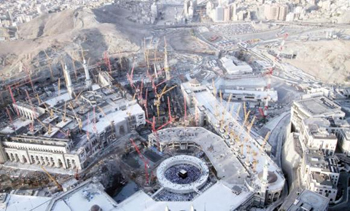 Makkah, Feb 28: Forty-five-year-old Syed Laeequddin Quadri, from Maharashtra, India, was standing in quiet contemplation straining his head to look at the golden crescent atop the majestic Makkah Clock Tower.
Makkah, Feb 28: Forty-five-year-old Syed Laeequddin Quadri, from Maharashtra, India, was standing in quiet contemplation straining his head to look at the golden crescent atop the majestic Makkah Clock Tower.
“That is unbelievable,” he told Arab News after Dhuhr prayers on Thursday. “Being a construction expert, I can imagine how much steel and concrete must have been poured into this gigantic project.”
Quadri is in the Kingdom on Umrah with his wife and four children. He is very familiar with the country having worked for the Saudi Binladin Group’s Operations and Maintenance Division in the early 1990s.
“I left the Kingdom for good 15 years ago,” he said. “I remember coming to the Holy Mosque for Umrah for the first time in 1991 with a friend. There was no Clock Tower, no Dar Al-Tawheed building,” he reminisced. “We were dropped by the cabbie right in front of the King Abdul Aziz Gate.”
Pointing at the sprawling marble-topped courtyard, he said: “This was not there.”
There was always construction activity in Makkah, he says. “In those days, you would always see earth-moving equipment and cranes at work on different projects,” he said.
However, the skyline was not dotted with the massive cranes as it is now. “Wherever you cast your eye from the Grand Mosque’s courtyard, you can see hundreds of red- and yellow-colored cranes, positioned at right angles,” said Quadri.
“We used to dine at Delhi Darbar Restaurant near the SAPTCO bus stop,” he said. “That is all gone. What used to be old buildings along Ibrahim Khalil Street housing pilgrims from India and Pakistan are all gone and instead we have the Jabal Omar Project. The mountain or the hillock is gone.”
On both sides of Ibrahim Khalil Street frenetic construction activity is going on, with the ground being leveled as part of the Grand Mosque expansion project.
According to reports in the local media, Makkah Hilton will no longer be where it is now. It will be shifted across the street. This is also the case with the Dar Al-Tawheed Intercontinental Hotel.
The Haram expansion project is being described as the biggest in Islam’s history. Once complete, it will significantly facilitate the journey of faith for millions of pilgrims.
“Every time I circumambulate the Holy Kaaba, my hands go up in prayer for the Saudi leadership for everything they’ve done and are doing to make Umrah and Haj comfortable,” said Quadri.
“When I came from Jeddah I saw mountains being cut away to expand the multi-lane highway. My eyes went moist. King Abdullah has excelled as the custodian of the holy mosques.”
Fifty-two-year-old Mustafa Anwar, from Alexandria, Egypt, was equally impressed.
“The expansion of the Holy Mosque symbolizes the rising tide of Islam,” he told Arab News. “I remember only a very few people from my country would come for Umrah 20 years ago,” he said. “That is not the case now, you have to apply months in advance with a travel agent because hundreds of thousands of people have the resources to undertake Umrah.”
Anwar said this is happening with Muslims all over the world. “More and more people are coming to perform Umrah and Haj, and naturally Saudi Arabia wants to provide the best of the best for them. And they are, much to the appreciation and wonderment of the pilgrims. Naturally, the Saudi leadership is showered with praise for taking such meticulous care of the Holy Mosque.”






Comments
Add new comment